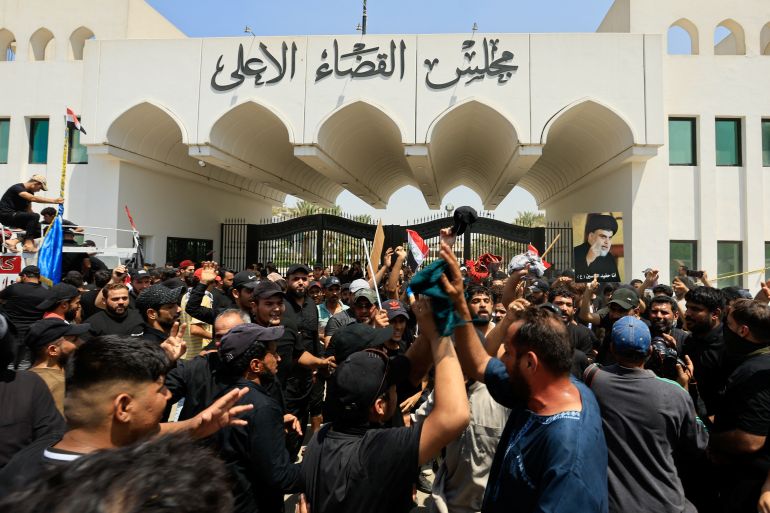Iraqi judiciary resumes work as political crisis ensues
Supporters of religious leader Muqtada al-Sadr launched a new sit-in in front of the Supreme Judicial Council, calling for the body to dissolve parliament.

Iraq’s judiciary will resume its activities on Wednesday after Shia cleric Muqtada al-Sadr called on his supporters to withdraw from outside its headquarters, the state news agency INA reported.
“In light of the withdrawal of the demonstrators and the lifting of the siege on the headquarters of the Supreme Judicial Council and the Federal Supreme Court, it was decided to resume work normally in all courts as of tomorrow morning,” the Supreme Judicial Council said.
Keep reading
list of 3 itemsFrantic rescue effort under way at Iraq shrine hit by landslide
‘No authority’: Iraq judiciary says it cannot dissolve parliament
Supporters of al-Sadr have rallied in front of the country’s Supreme Judicial Council, expanding a sit-in that initially began in front of the parliament building, and escalating their calls for parliament to be dissolved.
The locations, both in Baghdad’s heavily fortified Green Zone, a legacy of Iraq’s American occupation where government buildings and embassies are found, are now at the centre of a political storm in the country.
“These supporters came from the area in front of the parliament,” said Al Jazeera’s Mahmoud Abdelwahed, reporting from outside the Supreme Judicial Council earlier on Tuesday.
“They say that they are requesting that the Judicial Council dissolves the parliament, and obliges concerned authorities to hold early elections as a way to get out of the current political impasse.”
Al-Sadr had warned last Wednesday that he was giving the judiciary a week to dissolve parliament, but the Supreme Judicial Council stated that it does not have the authority to do so.
The populist leader has helped inflame tensions in Iraq in recent weeks by commanding thousands of followers to storm and occupy parliament, preventing the formation of a government nearly 10 months after elections.
However, he called on his supporters on Tuesday to withdraw from the vicinity of the judiciary authority and to keep only the protest tents and banners outside the building.
In a statement, he also urged the protesters to continue their sit-in outside the parliament.
The judiciary condemned the gathering of protesters outside its headquarters as “unconstitutional behaviour”, adding that protesters had sent threats by phone.
Prime Minister Mustafa al-Kadhimi, who cut short a trip to Egypt to deal with the crisis, urged all sides to calm down and renewed calls for a national dialogue.
In a statement, Kadhimi said disrupting the judiciary “exposes the country to serious risks”.
The standoff in Iraq is the longest stretch without a fully functioning government in the nearly two decades since Saddam Hussein was overthrown in a US-led invasion in 2003.
Supporters of the Shia religious leader, who has been a growing force in Iraqi politics over the last decade, emerged as the biggest party in parliament after elections in October.
However, they were unable to form a government, and al-Sadr ordered his parliamentary bloc to resign from their seats en-masse in June, which they promptly did.
The young cleric, who has unmatched influence in Iraq, can quickly mobilise hundreds of thousands of followers to stage demonstrations and paralyse the country’s convoluted politics.
Al-Sadr has also called for early elections and unspecified changes to the constitution.
His supporters have taken to the streets ever since and stormed parliament in July.
In return, supporters of al-Sadr’s Iran-backed rivals, the Coordination Framework Alliance (CFA), have held protests in August near the Green Zone, raising fears of a clash between the two groups.
Al-Sadr survived upheaval in the 19 years since his Mehdi Army militia took on the Americans with assault rifles and rocket-propelled grenades in the streets and alleys of Baghdad and southern cities.
His followers also fought the Iraqi army, Islamic State militants and rival Shia militias.
Most of Iraq’s Shia political establishment remains suspicious or even hostile to him. Still, his political organisation, the Sadrist movement, has come to dominate the apparatus of the Iraqi state since the 2018 election, taking senior jobs within the interior, defence and communications ministries.
While both al-Sadr and his CFA rivals belong to Iraq’s religious Shia bloc, al-Sadr has attempted to portray himself as an Iraqi nationalist, in contrast to what is perceived as the CFA’s pro-Iran ideology.
However, al-Sadr himself has had close ties to Iran in the past, and many critics worry about his potential to lead Iraq into violence.